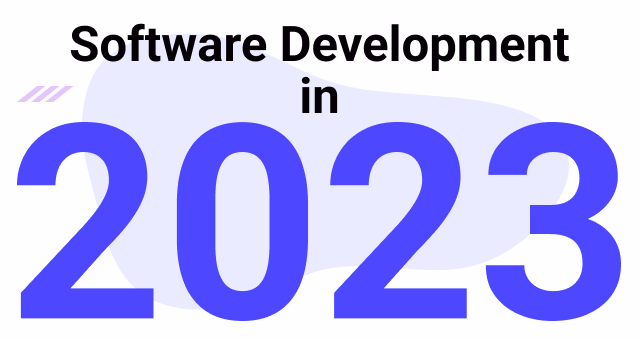Discover the cutting-edge trends and predictions for software development in 2023.
As the technology landscape evolves at an unprecedented pace, the world of software development is poised for significant transformations in 2023. We gave ourselves the task of delving into the emerging trends and predictions that are set to shape the field of software development in the coming year. From the rise of low-code and no-code platforms empowering non-technical individuals to AI integration and the increasing importance of DevSecOps, we explore the fascinating realm of serverless computing, edge computing, blockchain development, quantum computing, progressive web apps, microservices architecture, and the ethical considerations that will define the software development landscape in 2023. Let’s dive into the exciting advancements that await us in the world of software development.
- Low-Code and No-Code Development: The low-code and no-code development platforms will continue to gain popularity. These platforms allow users with limited coding skills to build software applications using visual interfaces and pre-built components, reducing the need for traditional programming expertise.
- Artificial Intelligence (AI) Integration: AI will become an integral part of software development, with developers incorporating AI technologies like machine learning, natural language processing, and computer vision into their applications. AI will enhance automation, data analysis, and decision-making capabilities of software systems.
- DevSecOps: Security will be integrated into the software development process more seamlessly through the adoption of DevSecOps. This approach emphasizes collaboration between development, operations, and security teams from the outset, ensuring security measures are implemented at every stage of software development.
- Serverless Computing: Serverless architecture, where developers focus on writing code without having to manage the underlying infrastructure, will gain traction. Serverless computing enables faster deployment, scalability, and cost optimization, as developers only pay for the actual usage of resources.
- Edge Computing: With the proliferation of Internet of Things (IoT) devices and the need for real-time processing, edge computing will become more prevalent. Software developers will need to create applications that can process and analyze data at the edge of the network, reducing latency and improving efficiency.
- Blockchain Development: Blockchain technology will find wider adoption beyond cryptocurrencies. Developers will explore new use cases for blockchain, such as supply chain management, smart contracts, and decentralized applications (dApps), requiring specialized skills in blockchain development.
- Quantum Computing: Although still in its early stages, quantum computing will gain attention in software development. Developers will start exploring quantum algorithms, programming languages, and tools to leverage the potential of quantum computers for solving complex problems.
- Progressive Web Apps (PWAs): PWAs will continue to grow as an alternative to native mobile apps. These web applications provide an app-like experience, enabling offline functionality, push notifications, and improved performance. Software developers will focus on building responsive and engaging PWAs.
- Microservices Architecture: Microservices will remain a popular architectural approach for building scalable and modular applications. Software development will involve designing and developing small, independent services that can be deployed and scaled individually, facilitating flexibility and rapid iteration.
- Ethical Software Development: There will be an increased emphasis on ethical considerations in software development, including privacy, data security, and algorithmic fairness. Developers will need to incorporate ethical principles and practices into their software development processes.
As we look ahead to software development in 2023, it is clear that the industry is undergoing remarkable changes. The convergence of technologies like AI, blockchain, and quantum computing is unlocking new possibilities and fueling innovation. With low-code and no-code platforms democratizing software development, and the increasing focus on security, scalability, and ethical considerations, developers must adapt and embrace these emerging trends. By staying abreast of the evolving landscape and leveraging these advancements, software developers can harness the power of technology to create transformative solutions that shape the future of our digital world. The future of software development is bright, and 2023 promises to be a year of groundbreaking progress and limitless opportunities!

